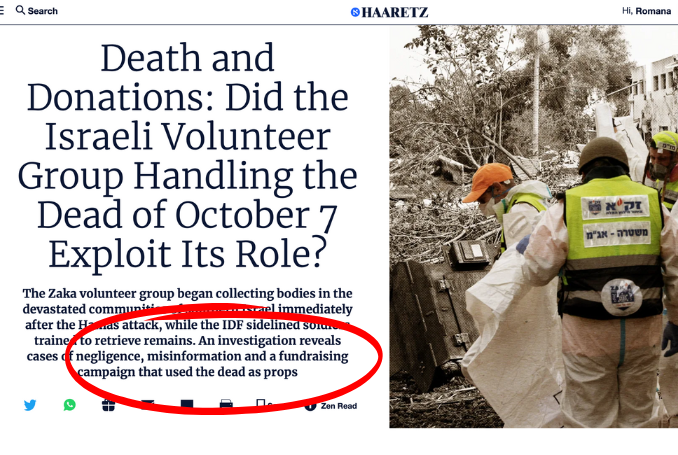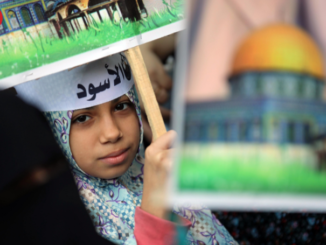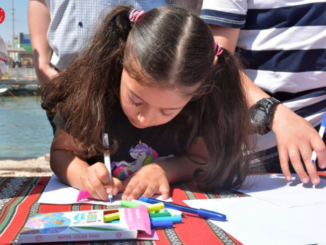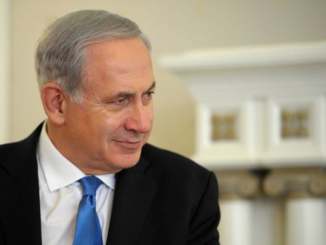
By Palestine Chronicle Staff – Gaza
Along with questions raised about the accuracy of events on October 7, are concerns surrounding the ZAKA volunteer group which immediately began collecting bodies in the aftermath of the Resistance operation.
Composed mainly of volunteers, ZAKA is a non-governmental ultra-Orthodox organization “with sole responsibility in Israel for dealing with incidents of unnatural death,” according to its website. Its task is to collect bodies and body parts, including blood, so that it can be buried in accordance with Jewish religious law.
An investigation by the Israeli newspaper, Haaretz, however, has raised several questions about procedures during the retrieval of the bodies.
The paper says “it is based on the accounts of military personnel present at the body retrievals and the Shura military base (which was made a body identification center), as well as volunteers from ZAKA and other rescue organizations who worked in the broader communities.”
It raised concerns that “in the first and critical days after October 7”, the Israeli military decided to forgo the deployment of hundreds of soldiers specifically trained in the identification and collection of human remains in mass casualty incidents.
“Instead, the Home Front Command chose to use ZAKA, a private organization, alongside soldiers in the Military Rabbinate’s search unit” for the south, the paper said.
Haaretz: Israel's ZAKA "was on the verge of insolvency after getting involved in debts of millions", then raised $14 million after October 7.
"Dozens of bodies wrapped with IDF space bags were rewrapped with ZAKA bags to promote PR for the org"
"Competing orgs" did the same! pic.twitter.com/HIYjGfxmzy
— Muhammad Shehada (@muhammadshehad2) January 29, 2024
Even though more personnel were necessary, soldiers from the Military Rabbinate’s search unit in the north and the Home Front Command’s unit “for collecting fallen soldiers” were reportedly told to wait.
“I have no explanation for why they didn’t deploy (the Home Front Command’s unit) and our people from the north,” an officer in the Rabbinate’s southern search unit is reported as saying.
‘Acted Unprofessionally’
In the meantime, Haaretz says ZAKA volunteers worked at the sites from morning to night. However, “as part of the effort to get media exposure, ZAKA spread accounts of atrocities that never happened, released sensitive and graphic photos, and acted unprofessionally on the ground,” the report states.
Sources at Shura told Haaretz that “We received bags of theirs without documentation, and sometimes with body parts that were unrelated to one another.”
Such problems made the identification process very difficult, according to the officer in the camp, who added that “Some bags came many days after the outbreak of the war.”
A volunteer who worked at Shura reportedly told Haaretz that “there were bags with two skulls, bags with two hands, with no way to know which was whose.”
In the following weeks, Haaretz reports, several hundred cases remained: bags with body parts that had been collected belatedly and which needed to be matched to victims.
“Some were still unknown as of the time of writing this article,” the report states.
Worth noting however is that Haaretz reports that it wasn’t only ZAKA personnel who caused problems. It quotes an officer in the search unit who said that initially his personnel “also failed to record where each body was taken from, which further delayed identification.”
Haaretz investigation reveals cases of negligence and the spreading of misinformation by the Zaka volunteer group, which began collecting bodies in the devastated communities of southern Israel immediately after the Hamas attack / @AronRabino1 https://t.co/ZAE3IuMq31
— Haaretz.com (@haaretzcom) January 31, 2024
‘Body Parts Left Behind’
Home Front Command soldiers and volunteers from other organizations “described negligent work by ZAKA in other aspects as well. According to them, on numerous occasions, they approached vehicles and houses with a ZAKA sticker stating that the place had been cleared of body parts when that wasn’t the case,” the paper reports.
A Shura volunteer is reported as saying that “ZAKA took part of a body and left the other part in the same house.” Houses labeled “cleared” were also found to still have human remains.
Other examples of inadequacies in ZAKA’s work, according to the Haaretz investigation is that “in the parking lot that was set up” where vehicles that were damaged on roads and near the music festival in Re’im, uncollected body parts were found.
“We found parts of bones and other parts there,” a Home Front Command soldier reportedly said.
BREAKING: Israel's leading outlet Haaretz has just published an investigation exposing the deranged Zionist Zaka group, which is the main source of all the atrocity propaganda repeated by the Western media, including the NYT's Jeffrey Gettleman and the Guardian's Bethan McKernan pic.twitter.com/IGTxy7GiZs
— ☀️👀 (@zei_squirrel) January 31, 2024
Credibility of Testimonies
In what the Haaretz article subtitles ‘Tales of Imagination’, it reports that a ZAKA volunteer “tearfully” recounted on social media that “We saw a woman, around 30 years old, (and) she was lying on the floor in a large puddle of blood, facing the ground.” The volunteer continued, “We turned her over in order to place her into the bag.”
“She was pregnant …Her stomach was swollen, and the baby was still attached by the umbilical cord when it was stabbed, and she was shot in the back of the head. I don’t know if she suffered and saw her baby murdered or not.”
The incident, which the volunteer alleged occurred in Be’eri, “simply didn’t happen, and was one of several stories that have been circulated without any basis.”
“There is no evidence for this incident, and no one in the kibbutz has heard of this woman. A ZAKA senior official admitted in a conversation with Haaretz that the organization knows the incident didn’t occur,” the Haaretz report states.
The article goes on to say that in another video, the same volunteer weepingly describes “how he found the burnt and mutilated bodies of 20 children in one of the kibbutzim.”
He told Haaretz that this was behind the dining hall in Kfar Azza, while in another instance, he said it was in Be’eri.
However, reports Haaretz, two adolescents, aged 14 and 16, were killed in Kfar Azza. Ten children were killed in Be’eri, but at least some were known to have been with a parent and were killed in their homes, the report adds.
Haaretz reports that the organization “has been accused of spreading false information before.”
In his initial article, @Gettleman prominently featured the claims of Yossi Landau, Southern Commander of the scandal-plagued ZAKA. (pic 1)
But Haaretz has already exposed Landau as a liar for falsely claiming that he saw burned babies and a fetus cut from a dead woman’s womb on… pic.twitter.com/jdt4zcXiwh
— Aaron Maté (@aaronjmate) January 31, 2024
Funding Increased
In December 2022, Haaretz reported that ZAKA had inflated its stated number of volunteers for years in order to receive more funding.
Haaretz reports that before October 7, the organization faced insolvency. “In the time since, says a source at ZAKA, they have raised over 50 million shekels ($13.7 million),” the report adds.
“Meanwhile, throughout the duration of the war, and despite the race against time to collect bodies, volunteers from the organization have arranged private tours for donors. Civilians, however, haven’t been allowed to enter the border areas, defined as closed military zones,” the Haaretz report states.
According to a December 2023 report by Mondoweiss, many of the reports in Israeli and international media networks — including CNN, the BBC, and the New York Times — which accuse the resistance of committing systematic sexual violence against Israeli women on October 7 – “rely on testimonies by Israeli ZAKA volunteers.”
“The testimonies provided by ZAKA’s members — all men, most of whom are volunteers …” the report states, “are based on their interpretation of what they claim to have seen on bodies they collected after the attack.”
“Not only do these men lack the professional qualifications to make such assessments (they are not medical experts), but their testimonies also lack details: no age, no location, and no time,” Mondoweiss stressed.
The report continues that “Details and/or evidence have not even been given to journalists who have asked to see them while reporting on these testimonies. This means that it is impossible to either confirm or debunk them.”
Hasbara – Public Diplomacy’
Mondoweiss also makes reference to the Israeli website Ynet having published a report about “how ZAKA was recruited to join Israel’s hasbara campaigns on the events of October 7, and conducted interviews with dozens of foreign journalists coordinated through the Government Press Office (GPO).” Hasbara, the report explained, is the Israeli term for “public diplomacy” or government propaganda campaigns.
The director of the GPO, Nitzan Hein, is quoted in the report as having stated, “It is difficult to imagine the Israeli hasbara with foreign correspondents without the remarkable, valuable, and effective role of ZAKA’s men. Their activity is extremely important in hasbara.”
On November 23, 2023, Prime Minister Benjamin Netanyahu reportedly met with the organization’s teams. He is reported as having said “You have an important role in influencing public opinion, which also influences leaders. We are in a war; it will continue. The war is not only to take care of the 1,400 people…but also to give us the maneuvering room.”
ZAKA was founded in the late 1990s by Yehuda Meshi-Zahav, who was previously the leader of Keshet, an ultra-Orthodox group. The group “fought against autopsies and archaeological digs in gravesites,” according to a YNet news article.
Meshi-Zahav ran ZAKA until 2021, when he attempted suicide after numerous allegations of rape and sexual assault against him, including of minors. He died in 2022.
(The Palestine Chronicle)








YOu DO NOT tell the truth the facts speak for themselves …You evidently don’t understand that